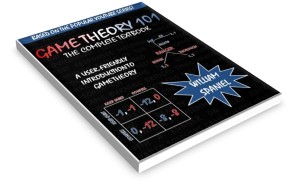Consider the following simple game of poker. Each player has a 13 card deck, with one of each rank, ace through 2. At the beginning of the game, each player draws a card randomly from the deck. They then simultaneously choose whether to bet $1 or fold. If either folds, no money exchanges hands. If both bet, then there is a showdown. Whoever has the highest rank wins the $1 from the opponent. In the event of a draw, no money changes hands.
How should the players strategize in this game? You might suspect that a player should bet if he or she has a higher than average card. But Bayesian Nash equilibrium makes a different prediction.
Takeaway Points
- A type with the highest rank card (ace) has a weakly dominant strategy to bet. At worst, they draw. And against any opponent who bets with a card worse than ace, the ace type makes money.
- A type with the lowest card rank (2) has a weakly dominant strategy to fold. At best, they draw against another 2. At worst, any opponent that bets with any other card rank will cause the 2 type to lose.
- The previous point alters how a type with a 3 would want to play. The only way he or she can win is if a 2 bets. But if a 2 does not bet, then the best a 3 can do is draw. Thus, in the remaining game, the 3 type has a weakly dominant strategy to fold.
- The previous two points alters how a type with a 4 would want to play. The only way he or she can win is if a 2 or 3 bets. But if a 2 or 3 does not want to bet, then the best a 4 can do is draw. Thus, in the remaining game, the 4 type has a weakly dominant strategy to fold.
- This logic works all the way up to the rank of king. Despite being the second-highest rank, the king type anticipates that everyone other than an ace or king should fold. Thus, the king type also folds.
- The unwillingness for all types other than the best hand to fold is why poker games require players to place an ante before the start of a hand. That existing money in the pot gives weaker hands a temptation to bet so they can acquire the money up for grabs.
- The general effect described here is known as the unraveling principle. It arises in many other situations, and we will discuss it further later in this course.

